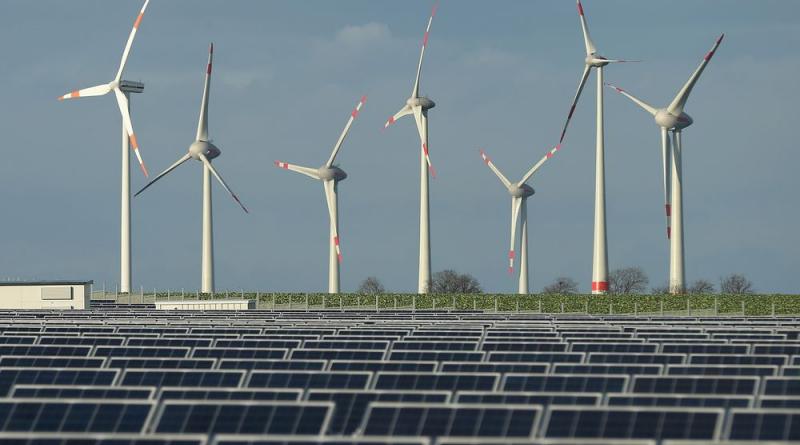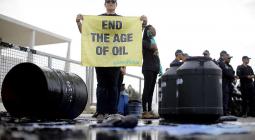With COVID-19, energy markets are turning towards clean energy investments.

Renewable projects going ahead as oil and gas companies withdraw from projects
There were a couple of surprising things that came out of Australian oil and gas producer Santos’ annual general meeting last week.
Firstly, the chairman highlighted that they have pretty radically cut their capital expenditure budget which has involved them delaying the final investment decision on their $7 billion investment in the Barossa field offshore the Northern Territory in Australia. He also announced that they have actually withdrawn from fracking in the Northern Territory for the rest of 2020. Who knows when they will resume that exploration project. And the Independent Planning Commission’s decision for the Narrabri project in New South Wales looks to have been delayed until late in 2020.
The third thing that happened that was really interesting was that a shareholder resolution was put to the board over climate change, and the board recommended against shareholders voting for this resolution. Between 43% and 46% of shareholders had voted for the climate resolutions.
The first resolution they voted for was a request that the board disclose details of how its’ investments and capital expenditure aligned with the Paris Agreement goals, and to disclose Santos’ emissions targets. And the second one that a big slab of shareholders voted for was a request that the board commission a review of its memberships of peak bodies such as the Queensland Resources Council and APPEA, which is the peak body for oil and gas companies. It’s unusual in a company for a board to recommend against voting for a resolution while there is a large number of shareholders voting for that resolution, which was the case here. Clearly shareholders are very concerned about climate change and the effects of this on oil and gas producing companies.
Santos – and other gas companies – that are looking at what happened at Santos’ AGM don’t really have a choice.
SANTOS HAVE A BIG NUMBER OF SHAREHOLDERS CONCERNED ABOUT CLIMATE CHANGE; particularly big given that Santos have an anchor shareholder that owns 30% of the company which would have voted for the resolutions. So, Santos have a large number of institutional investors that are clearly dissatisfied with the direction the board is taking. They have got to deal with it. You can’t have that number of shareholders unhappy with your performance and continue on with the old ways.
At the moment Santos have a pretty aggressive, it could be said, expansion policy. They are looking at producing more and more gas at a time when methane emissions are expanding rapidly around the globe. Methane accounts for 25% of all greenhouse gas emissions – it’s a particularly powerful greenhouse gas. So Santos are talking about expanding, and the shareholders are saying well, we’ve got a bit of a problem with that. Santos have to really deal with the issue.
Late last week there was a bit of rally in the oil price up to US$30/barrel for Brent crude, up from the $24 level. That was on the back of President Trump talking about a possible agreement with the Russians and the Saudi’s.
I think it is far too early for anything like that to occur. If you look at the history of this, the Saudis effectively started producing to their maximum ability before this covid-19 crisis that we’ve seen in the oil markets. Covid-19 has spurred a fall in demand. Demand won’t return to the old levels when things normalise over covid-19. When you have major crisis like this, people’s consumption patterns permanently and irrevocably change.
WHERE IT LEAVES OPEC AND OTHER OIL PRODUCING NATIONS is that it will make a resolution of their current market share war that much more difficult to achieve, because they will be arguing over a smaller pie. There’s simply a smaller amount of oil and gas consumption that these companies and nations will be arguing over, and it’s going to make a resolution, I believe more difficult, not easier.
Globally, we are already seeing more bankruptcies. Last week in the U.S., Whiting Petroleum went broke, which was a pretty sizable shale fracking company. We also saw Callon Petroleum call in the merchant bankers to try and restructure its’ debt; it’s now staring down the barrel of bankruptcy. And we will see me more and more companies in the U.S. go bankrupt. They simply can’t operate at the current prices and make money in the U.S. The industry as a whole hasn’t made money for the last decade at the free cash flow level. And basically, the equity and debt markets – that’s the bankers and the people that buy the shares of these companies – have lost patience with the industry. So we will see plenty more bankruptcies in the U.S.
In Australia at the moment, companies can’t really make money when oil is below $35/barrel. They are scrambling to try and cut costs. They are going to struggle with current oil prices.
We have already been seeing a turn in the energy markets, in terms of recovery, towards more clean energy investments. While we’ve got Origin and Santos pulling back on capital expansion projects, in the renewables space, they are forging ahead.
Acciona, the big Spanish company, announced one of the largest wind farm investments in the world in Queensland last week. That’s a big move to actually give a $1.96bn final investment decision in a very uncertain environment. We have also seen the old Kidston gold mine pumped hydro and solar project in Queensland sign a power purchase agreement with Energy Australia. That looks like it is going to go ahead in the short-term, now that it has locked down a customer.
WE ARE SEEING RENEWABLES PROJECTS GO AHEAD at the same time as we are seeing oil and gas companies withdraw from projects.
The reason why we are seeing renewables projects go ahead is that their largest cost is finance, and financing costs have fallen. If you have a company that can get someone to buy the electricity off them, they will go ahead.
The two things that are restricting renewables in Australia are getting connection to the network, so there are network constraints, and getting a customer. If you get those two things sorted out, you will find that projects will go ahead. The Queensland government are helping the Kidston gold mine project actually get a better connection.
So these projects – these large investments at scale – are going ahead.
Bruce Robertson is IEEFA’s gas/LNG analyst.
This is an excerpt from an interview with Bruce Robertson that aired on 3 April 2020.
6 April 2020
IEEFA




